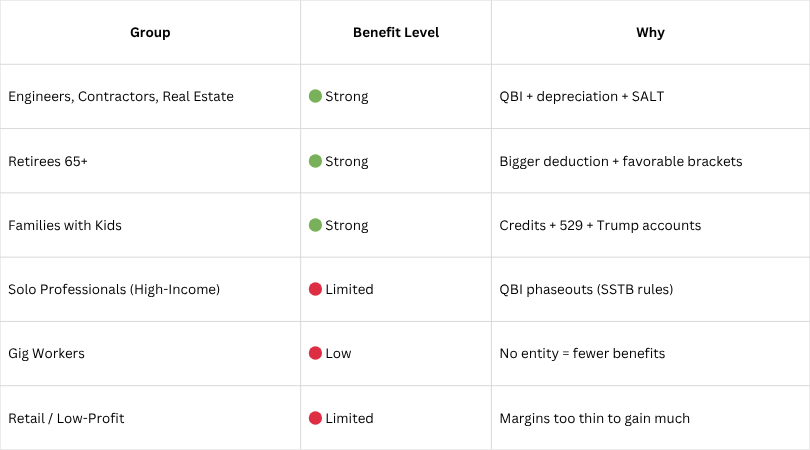
On July 4, 2025, Congress passed the One Big Beautiful Bill Act (OBBBA)—a sweeping tax package that makes many of the Trump-era tax cuts permanent while adding a few twists of its own.
So who does this help? And who’s left out?
Below, we break down who benefits the most and the least, not just by income level, but by real-life scenarios and industry types.
If you own an LLC, S-Corp, or partnership—especially in engineering, architecture, construction, real estate, skilled trades, or non-medical consulting—you’re in luck.
✅ The 20% Qualified Business Income (QBI) deduction is now permanent
✅ You can still deduct big equipment purchases (thanks to bonus depreciation)
✅ SALT deduction cap went up (temporarily)
Example:
A plumbing business making $300,000 in profit can now deduct $60,000 under QBI, reducing taxes significantly.
The estate tax exemption is now $15 million per person, or $30 million per couple.
✅ More flexibility for large gifts, legacy planning, or trust structuring
✅ Less urgency around rushing gifting strategies
There’s now a bigger standard deduction just for being over 65. Combined with lower brackets, many retirees will owe less—even if their income stays the same.
Example:
A retired couple drawing $80K from IRAs and Social Security might pay no federal income tax at all under the new rules.
✅ $2,000 Child Tax Credit stays in place
✅ New “Trump Accounts” for minors
✅ More flexibility with 529 plans
Example:
A family with three kids could reduce their tax bill by $6,000—and start long-term investing for their kids’ futures with the new accounts.
This includes financial advisors, doctors, lawyers, accountants, consultants, and entertainers making over ~$340K (married). At that level, the 20% QBI deduction phases out.
Example:
A solo attorney earning $500K may see no benefit from the QBI deduction.
Even if eligible for QBI, the savings might not move the needle if profits are slim.
Example:
A small retail shop earning $1M in revenue but only $50K in profit doesn’t get much out of the deduction.
If you drive for Uber or do freelance work but don’t set up an LLC or S-Corp, you might miss out on most business tax benefits—and pay self-employment tax on top of income tax.
There’s a new rule: if you make over $500K/year, the amount of your charitable donations you can deduct is capped at 35% of your income. Also, only donations over 0.5% of your income count.
Example:
If you make $1 million and donate $5,000, it might not count at all unless you itemize and meet the floor.

Bottom Line:
The new tax law is great for some and… underwhelming for others. Knowing where you stand can help guide your next move—whether that’s how you pay yourself from your business, give to charity, or plan your legacy.
Want help making it work for you?
Let’s talk.


